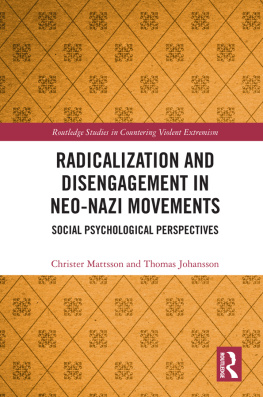Omar Ashour - The De-Radicalization of Jihadists: Transforming Armed Islamist Movements
Here you can read online Omar Ashour - The De-Radicalization of Jihadists: Transforming Armed Islamist Movements full text of the book (entire story) in english for free. Download pdf and epub, get meaning, cover and reviews about this ebook. City: London, year: 2009, publisher: Routledge, genre: Science / Politics. Description of the work, (preface) as well as reviews are available. Best literature library LitArk.com created for fans of good reading and offers a wide selection of genres:
Romance novel
Science fiction
Adventure
Detective
Science
History
Home and family
Prose
Art
Politics
Computer
Non-fiction
Religion
Business
Children
Humor
Choose a favorite category and find really read worthwhile books. Enjoy immersion in the world of imagination, feel the emotions of the characters or learn something new for yourself, make an fascinating discovery.

- Book:The De-Radicalization of Jihadists: Transforming Armed Islamist Movements
- Author:
- Publisher:Routledge
- Genre:
- Year:2009
- City:London
- Rating:3 / 5
- Favourites:Add to favourites
- Your mark:
The De-Radicalization of Jihadists: Transforming Armed Islamist Movements: summary, description and annotation
We offer to read an annotation, description, summary or preface (depends on what the author of the book "The De-Radicalization of Jihadists: Transforming Armed Islamist Movements" wrote himself). If you haven't found the necessary information about the book — write in the comments, we will try to find it.
This book is the first detailed study of the causes of de-radicalization in armed Islamist movements. It is based on frontline research that includes interviews with Jihadist leaders, mid-ranking commanders, and young sympathizers, as well as former security and intelligence officers and state officials.
Additionally, it is also the first book to analyze the particular conditions under which successful de-radicalization can take place. The current literature on Islamist movements attempts to explain two principal issues: their support of violence (radicalization) and their changing attitudes towards democracy and democratization (moderation). However, the reasons behind renouncing (behavioural de-radicalization) and de-legitimizing (ideological de-radicalization) violence have not been evaluated to date. The author provides an in-depth analysis of the de-radicalization processes of the Egyptian Muslim Brothers (1951-73), former allies of al-Qaida, such as al-Gamaa al-Islammiyya (Islamic Group of Egypt, 1997-2002) and al-Jihad Organization (2007- present), as well as of Algerian Islamist groups (1997-2000). The book also analyzes cases of de-radicalization failure.
The two questions that the book highlights and attempts to answer are Why? and How? For example, why do radical Islamist militants revise their ideologies, strategies and objectives and initiate a de-radicalization process; and what are the necessary conditions behind successful de-radicalization? De-radicalization of Jihadists shows how a combination of charismatic leadership, state repression, social interactions and selective inducements can ultimately lead jihadists to abandon jihad and de-legitimize violence.
This book will be of great interest to students of radical Islamist movements and Islamic Studies, terrorism and political violence, security studies, and Middle Eastern politics.
Omar Ashour is a Lecturer in Politics in the Institute of Arab and Islamic Studies, University of Exeter. He has a PhD in International Relations from McGill University in Canada.
Omar Ashour: author's other books
Who wrote The De-Radicalization of Jihadists: Transforming Armed Islamist Movements? Find out the surname, the name of the author of the book and a list of all author's works by series.









